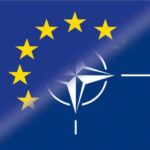On November 19 and 20, Lisbon will be hosting the latest NATO Summit. The main purpose behind the Summit will be to adopt a new ‘Strategic Concept’  and try to bring Russia closer to the Alliance. This Summit is extremely important for the future of the Alliance and transatlantic relations. For these reasons, I will closely monitor the evolution of the conference, while commenting on the major themes addressed throughout the two day meetings. However, today I would just like to offer some thoughts on the future of the Alliance before the beginning of the Summit.
and try to bring Russia closer to the Alliance. This Summit is extremely important for the future of the Alliance and transatlantic relations. For these reasons, I will closely monitor the evolution of the conference, while commenting on the major themes addressed throughout the two day meetings. However, today I would just like to offer some thoughts on the future of the Alliance before the beginning of the Summit.
With the end of the Cold War, the transatlantic partnership has gone through a period of introspection and transformation. The original ‘raison d’être’ of NATO disappeared with the collapse of the Soviet Union. Since then, the role, purpose and impact of the transatlantic partnership have been in question as new challenges emerged. In this multipolar world new international players, such as transnational crime organizations, transnational terrorist networks and so on, have become active actors challenging world stability.
The fight against terrorism is one of the most concrete challenges facing the transatlantic partnership. The war in Afghanistan is a piece of the puzzle and will most likely affect the future of the transatlantic partnership. The ISAF mission proves to be difficult as it is the first ‘out of area’ mission for NATO. Afghanistan is also illustrating growing tensions between the US and its European allies. Most of European partners, like France, the Netherlands, and Germany, have started to distance themselves from the war as it is causing domestic tensions. These strategic and political divisions among transatlantic partners should be perceived and understood as fundamental challenges for its future.
Another core challenge is the current economic crisis. Since 2007, the gap between European nations and the US has intensified on military spending and budgets. European states, at the exception of the UK and France to a lesser extent, have been cutting military spending. On the other side, the US, weakened by the financial crisis, is progressively losing its partners in the sharing of military burdens. This economic question could affect on the long term the political cohesion between allies, while damaging US perceptions of having committed European partners.
A third challenge concerns the question of enlargement of the transatlantic partnership. Such issue touches directly the core of the relations between NATO and Russia. Since the arrival in power of Mr. Putin, Russia has adopted a more nationalist and aggressive foreign policy in order to expand Russia’ sphere of influence. Keeping the current status quo on Ukraine and Georgia can only damage the relations and the stability of the European continent. The institutional structure between NATO and Russia must be strengthened and employed consistently for dialogue.
Last but not least, the ‘raison d’être’ of the transatlantic partnership must be re-thought. NATO was designed as a military alliance protecting Europe from a soviet invasion. Such account is not valid anymore, even though Russian foreign policy still remains worrisome. Transatlantic partners must design a NATO 2.0 and a partnership in accordance to current and future threats. A new security doctrine, including new threats assessment, strategy focus, and dynamics of the transatlantic relations, must be designed and implemented as fast as possible. In term of strategy, the following questions should be at the center of debate: should NATO constrain its military and security operations to Europe? Or should NATO sphere of influence be expanded to the geographical roots of the threats challenging not only the transatlantic community but also world stability?
The modern threats are new, challenging and lethal. The Lisbon Summit should be used as a platform for strengthening the ties between transatlantic partners, between the EU and NATO, between the West and Russia, while laying down the bases for a new security doctrine. A new strategy encompassing all these elements will be central for the future of the Alliance.